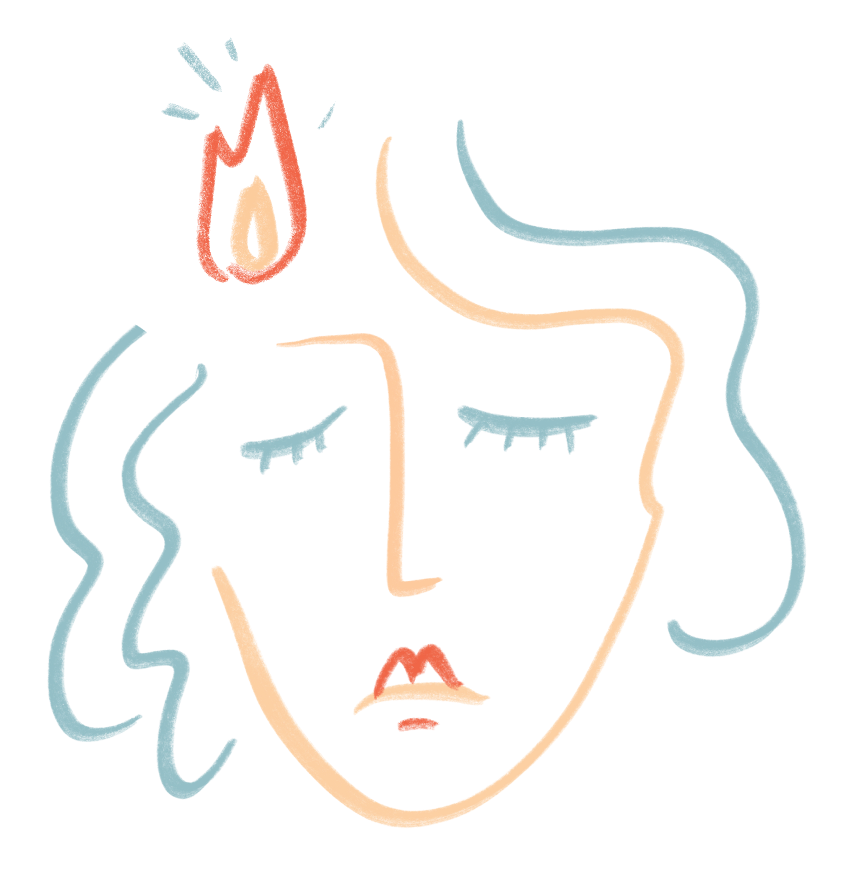LOW LIBIDO DEFINITION
When we discuss sexual desire or libido, we are talking about your interest or motivation to seek out and engage in sexual activities. Everyone’s levels of desire are different – some might be satisfied having sex once every few months or years and for others it might be once every few weeks or days.
Perhaps you are having no sex at all, and you feel totally satisfied and fulfilled – totally okay! There is no normal or right amount of sex to be having and low libido in menopause is only a problem if you think it is.
Start your free online menopause assessment to see if HRT is right for you

HOW LIKELY IS LOW LIBIDO DURING MENOPAUSE?
- Difficulties with libido are some of the most prevalent sexual issues worldwide, particularly during menopause
- While some find their desire for sex increases, most report the exact opposite
- Studies have found that over 50% of those in midlife report having low libido
Read more about the stages of menopause.
HOW CAN YOU EASE LOW LIBIDO SYMPTOMS DURING MENOPAUSE?
While hormones are not always to blame, they can play a big role. Reduced oestrogen levels can affect the way the nerves supplying the clitoris and vagina work, making them less sensitive. The same hormonal changes can cause vaginal dryness, tightness and increasingly delicate vaginal tissues, all of which can make sex seem unappealing at best.
However, hormones aren’t the whole story. If you are unfamiliar with your own desire, it may contribute to distress associated with low libido or loss of libido during menopause.
Know your desire type and reframe the way you think about it
The first step to improving libido is to understand that there is more than one form of sexual desire. You have likely heard of spontaneous desire, which is that sudden and immediate desire for sex (often arising out of the blue). However, the most common form in women is responsive desire, which means that you require stimuli (such as a make-out session or back rub) in order for desire to grow. It is all about getting yourself into that headspace for sex.
Be open to getting in the mood
Sometimes you might feel neutral about having sex or would like to feel sexual but aren’t quite there yet. Consider being open to the possibility of responsive desire building. This does not mean forcing yourself to have sex or having sex out of obligation but rather staying open to getting in the mood and consciously creating opportunities for intimacy – perhaps with a cuddle or a massage. If you end up wanting to have sex, then great, but if not, you can stop.
Understand your brakes and accelerators
When you are experiencing low or loss of libido, we often think that we need more gas or accelerator (as in more erotica, sex toys, a more attractive partner etc) when really, what we need is to take our foot off the brakes (stress, fatigue, disconnection). Try Emily Nagoski’s Sexual Temperament Questionnaire to help you understand what impacts both you and your partner.
Improve foreplay
When it comes to good sex, foreplay is key to building anticipation and creating intimacy. Kissing and cuddling is important but foreplay could also include things like scheduling sex, sending a sexy text, or wearing underwear that makes you feel sensual.
Improve communication
Communication is essential to cultivating your libido and sexual satisfaction. If you are experiencing a decreased interest in sex, let your partner know.
Try sensate focus
Sensate focus is an effective sex therapy technique that helps people overcome libido problems by focusing primarily on sensations and not focusing on orgasm as the goal. You can read more about sensate focus here.
Practice mindfulness
Mindfulness has been shown to be highly effective in improving low libido. The practice involves increasing sexual awareness – how you are feeling and responding in the moment. It has been found to improve libido by boosting mood, increasing self-compassion and reducing distraction. Some great apps for mindful sex are Ferly, Coral and Blueheart.
Manage your medications
Some drugs, such as antidepressants, can negatively impact your libido. It’s best to discuss this with your doctor to see if you can find alternatives.
Work on your self-esteem and body image
Many report that the physical changes that can accompany ageing and menopause leave them feeling a lower sense of self-esteem and confidence about their bodies, particularly when it comes to sex. Read more about how to boost your sexual self-esteem during menopause.
Try sex therapy
Sex therapy is a great way of uncovering the psychological, emotional, or practical dynamics that are repressing your desire and addressing them. Find out more about what sex therapists do and how to find one.
Challenge your mindset around sex and intimacy
It’s not a good idea to have sex when you don’t want to. Sometimes you may just want some closeness or intimacy without having to commit to sex, which may feel like too steep of a climb.
For example, imagine every time that you get hungry for a small snack, that you have to commit to eating a three-course meal. It is the same with sex. Sometimes we might just want some touch without having to commit the whole act. That is totally OK. Have the mindset that if sexual desire arises then great, but if not, we can just enjoy what we are doing. Without guilt.
Don’t force sex
Forcing yourself to engage in sex when you’re not necessarily in the mood, or dealing with low libido because of menopause, can create emotionally harmful and uncomfortable sex. While this may start with good intentions, such as pleasing a partner, the partner often also isn’t fully happy as they are aware that you are not fully enjoying the experience. You need to be engaging in sex for you.
Would hormone replacement therapy (HRT) help?
HRT can help with low libido for some, and is proven to help with hot flushes, night sweats and mood changes, sleep, among others. Both standard HRT (containing oestrogen) and testosterone can be prescribed, although most doctors will suggest trying standard HRT for a few months before adding in testosterone if needed.
HRT is not suitable for everyone. Speak to your doctor if you would like to find out more about the best treatment for you.
Read more about the HRT risks and benefits.





